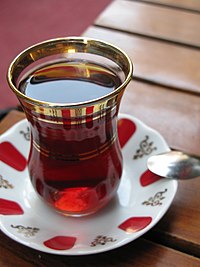
Photo from wikipedia
ABSTRACT Purpose: Despite recent improvements in the quality and availability of educational materials to promote heat safety in agriculture, success in addressing the factors that inhibit the adoption of self-protective… Click to show full abstract
ABSTRACT Purpose: Despite recent improvements in the quality and availability of educational materials to promote heat safety in agriculture, success in addressing the factors that inhibit the adoption of self-protective practices among farmworkers remains limited. Social marketing interventions can address gaps between safety knowledge and implementation by targeting segmented audiences with tailored behavioral products that compete with comfortable yet potentially harmful alternatives. The purpose of this study was to collect preliminary biological and survey data during a 5-day period in the spring of 2019 to identify hydration levels, perceptions, attitudes, knowledge, and behaviors associated with the prevention of heat-related illness (HRI) among 29 tomato harvesters in southwest Florida. Methods: Urine samples were collected before and at the end of each workday. Survey data were collected at baseline and at the end of each workday. Reagent strips were used to assess urine specific gravity, a measurement of hydration status. Descriptive statistics, relative frequency distributions, and bivariate correlation analysis were used to summarize the data. Results/Findings: Results showed that a majority of study participants were slightly or not at all concerned about becoming ill from the heat while working despite the wide prevalence of HRI symptoms. On average, participants were hypohydrated both at the start and end of each workday. Certain cooling practices, such as consumption of electrolyte drinks, tended to be implemented at the onset of HRI symptoms. More than 75% of the harvesters typically avoided taking any rest breaks. Yet all had received some form of heat safety training; knowledge test scores averaged 78%. Findings suggest safety behaviors had more to do with the amelioration of HRI symptoms than with training and knowledge. Practical application: To effectively encourage heat safety among Florida tomato harvesters, social marketing efforts must shift current behaviors from a reactive to a preventive orientation.
Journal Title: Journal of Agromedicine
Year Published: 2020
Link to full text (if available)
Share on Social Media: Sign Up to like & get
recommendations!